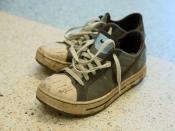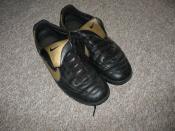Nike: The Sweatshop Debate (Case Study)In today's business world, a company's ethical behavior is constantly under the microscope; and more specifically, the larger the company, the more intense the magnification. Unethical behavior and what some even characterize as evil behavior, has been witnessed as a practice of some global companies. Surprisingly, one of the most recognizable companies in the world was once at the forefront of scrutiny and judgment for its unethical practices. Established in 1972, Nike, one of the leading marketers of athletic shoes and apparel on the planet, has brought in billions of dollars in revenues and sold its products in some 140 countries (Hill, 2009). American companies have sought to outsource their manufacturing through cheap labor, and Nike has been accused of for abusing its overseas workforce in sweatshops. The fight against Nike still continues and a film documentary entitled "Sweat," which follows a team as they learn and document from first-hand experience, Nike's operations, is scheduled to be released later this year (Educating for Justice Films [EJF], 2009).
In this paper, I will evaluate and discuss the case study about the Nike sweatshops as written by author Charles W. L. Hill in his book International Business: Competing in the Global Marketplace. I will analyze the legal, cultural, and ethical challenges presented, the roles that governments played in the global operation, and finally, I will summarize the strategic and operational challenges facing global managers as illustrated in the case.
As previously mentioned, ethical issues surrounding Nike have been, in my opinion, the foundation and catalyst for the entire debate and the building block for the legal and cultural challenges that were examined thereafter. In regard to legal and cultural challenges, Nike was found to have had major labor practice issues, including hazardous working conditions, violations of...



Understood
Yes, I could have done more research; unfortunately I only had 2 hours prior to class to write this awful essay (I didn't think it was up to par with what I'm capable of writing), but then again, some tough things happened that weekend and I had to do this 1 hour at home and 1 hour on the road on the way to school. I think that for that, getting an A was nice. But yes, I would also have graded it lower since there is not much research on particularly the legal aspect. Thanks for your comment (mouse40); good stuff.
author
1 out of 1 people found this comment useful.